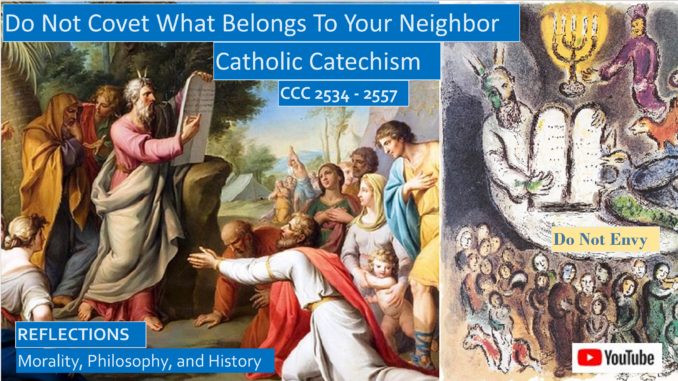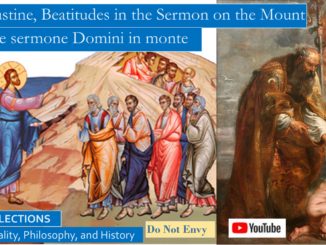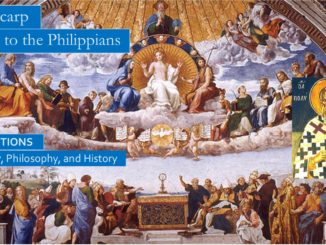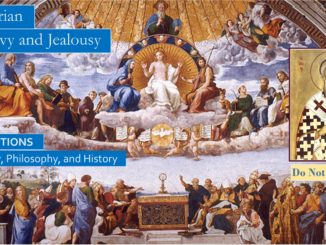
Jesus bids his followers to renounce all they have and follow him. More blessed are the poor who are generous than the rich who are miserly, Jesus points to the poor widow who gives drops a mite in the collection box, for that is all she has.
Read the Catholic Catechism on US Bishops website
Please read our other blogs on the Catholic Catechism on DO NOT ENVY:
Catholic Catechism, Do Not Covet, CCC 2514-2516: https://wp.me/pachSU-e1
Catholic Catechism, Do Not Envy, Purification of the Heart, CCC 2517-2533, https://wp.me/pachSU-eb
Catholic Catechism, Thou Shalt Not Covet thy Neighbors Possessions, CCC 2534-2540, https://wp.me/pachSU-eq
Please view our YouTube Videos on DO NOT ENVY your neighbor’s wife: https://youtu.be/vhte2s1ITNU and https://youtu.be/v_BmOU1VcHQ
Please view our YouTube Video on DO NOT ENVY your neighbor’s possessions: https://youtu.be/8QHrtKGDzKM
The Catechism quotes both the Sermon on the Mount in Matthew, Blessed are the poor in spirit, and the Sermon on the Plain in Luke, Blessed are the poor.
The Beatitudes in Luke pair each blessing with its opposite woe:
“Blessed are you poor, for yours is the kingdom of God.
Blessed are you who hunger now, for you shall be satisfied.
Blessed are you who weep now, for you shall laugh.
Blessed are you when men hate you,
and when they exclude you and revile you,
and cast out your name as evil, on account of the Son of man!
Rejoice in that day, and leap for joy,
for behold, your reward is great in heaven;
for so their fathers did to the prophets.
But woe to you who are rich, for you have received your consolation.
Woe to you who are full now, for you shall hunger.
Woe to you who laugh now, for you shall mourn and weep.
Woe to you, when all men speak well of you,
for so their fathers did to the false prophets.”[1]
Jesus does not say, Blessed are you poor who are deserving,
Jesus does not say, Blessed are you poor who are working,
Jesus does not say, Blessed are you poor who are not loafing,
Jesus simply says, Blessed are you poor,
And for emphasis, Jesus also says, Woe to you who are rich,
for you have received your consolation.
As the Catechism reminds us, “The Lord grieves over the rich, because they find their consolation in the abundance of goods.”
Does this mean that Jesus expects us to bless that poor drunk begging outside our car? Some of these people have that I have been in the sun way too long sort of look that means they could never get a job even if they suddenly wanted to reform themselves, and some of them are psychologically incapable of even conceiving what it would be like to improve themselves.
Maybe we should at least bless the poor with props. One time I did give to someone who was begging for a twenty to fill a prescription at a gas station, the Hummer guy next to me sneered at this lady and her husband in a wheelchair, but I gave them the twenty and they were both so grateful and happy and she wheeled straight across the street to the drugstore, and I never saw them beg again. At least a small portion of the poor will spend their beggings on food rather than beer.
Compare this with the spiritual Beatitudes in Matthew:
“Blessed are the poor in spirit, for theirs is the kingdom of heaven.
Blessed are those who mourn, for they shall be comforted.
Blessed are the meek, for they shall inherit the earth.
Blessed are those who hunger and thirst for righteousness, for they shall be satisfied.
Blessed are the merciful, for they shall obtain mercy.
Blessed are the pure in heart, for they shall see God.
Blessed are the peacemakers, for they shall be called sons of God.
Blessed are those who are persecuted for righteousness’ sake, for theirs is the kingdom of heaven.
Blessed are you when men revile you and persecute you and utter all kinds of evil against you falsely on my account.
Rejoice and be glad, for your reward is great in heaven, for so men persecuted the prophets who were before you.”[2]
CATHOLIC CATECHISM, DO NOT COVET, SECTIONS 2541-2550[3]
The Catechism quotes the commentaries on the Beatitudes both by St Augustine and by St Gregory of Nyssa. St Gregory of Nyssa’s commentary is referenced not once, but twice.
Read St Gregory of Nyssa on the Beatitudes, Blog 1, Blog 2, Blog 3, Blog 4, Blog 5
Read blog on St Augustine on the Beatitudes, Sermon on the Mount.
In the Beatitude, Blessed are the poor in spirit, for they shall see God, St Gregory of Nyssa teaches us, “He who is given the riches of the soul in exchange for material wealth, who is poor for the sake of the spirit.” This commentary is referenced by the Catechism in Section 2546, which teaches us that “voluntary humility is poverty in spirit,” which guards us from soul-destroying envy. Section 2547 of the Catechism quotes St Augustine: Let the “proud seek after and love the kingdoms of the earth” while the poor in spirit possess the kingdom of heaven. Those who are poor in spirit guard their heart from the sin of envy and covetousness, and those who are poor live a life like that of Christ, the Christ whom St Paul reminds us became poor for our sakes.
In the Beatitude, Blessed are the meek, for they shall inherit the earth, St Gregory of Nyssa teaches us, “Man’s character is divided into opposite impulses. Wrath is opposed to gentleness, arrogance to modesty; envy to wishing people well, and hate to a loving and peaceable disposition.”
In the Beatitude, Blessed are the merciful, for they shall obtain mercy, St Gregory of Nyssa teaches us, “If all men were merciful, if all men were generous, if all men were kind, there would be not hatefulness. “Envy would be futile, hate would die out, remembrance of injuries would be banished along with lies, fraud, and war, all of which are the offspring of covetousness.” “Wrath is a bitter despot, and so is envy,” and “greed surpasses all tyrannies in venom.”
In the Beatitude, Blessed are the clean of heart, for they shall see God, St Gregory of Nyssa teaches us, “Desire for true happiness frees man from his immoderate attachment to the goods of this world so that he can find his fulfillment in the vision and beatitude of God. …. Whoever sees God has obtained all the goods of which he can conceive,” which is quoted in section 2548 of the Catechism.
In the Beatitude, Blessed are the Peacemakers, St Gregory of Nyssa teaches us hate and wrath, and anger and envy destroy the peace in our heart, “harboring resentment and hypocrisy and the calamity of war.”
In the Beatitude, Blessed are those who hunger and thirst after justice and righteousness, St Gregory of Nyssa teaches us that “the disease of envy and hypocrisy is cherished secretly in the depth of the heart, like a hidden fire,” while the hypocrite deceives by appearing to be a friend. He may hide his anger and envy from a sense of shame, but the fire buried under chaff still smolders, but if the person he envies “meets with some misfortune, then he reveals his disease, because he makes that man’s sorrow his own joy and pleasure.”
The Catholic Catechism teaches, “the economy of law and grace turns men’s hearts away from avarice and envy,” quoting St Paul in Romans, “What then should we say? That the law is sin? By no means! Yet, if it had not been for the law, I would not have known sin. I would not have known what it is to covet if the law had not said, ‘You shall not covet.’ ”[4]
VATICAN II, LUMEN GENTIUM
The Catholic Catechism quotes from the Vatican II Constitution of the Church, Lumen Gentium in Section 2545. The Vatican translation in the Catechism differs, this is how it is translated in Lumen Gentium: “Therefore, all the faithful of Christ are invited to strive for the holiness and perfection of their own proper state. Indeed, they have an obligation to so strive. Let all then have care that they guide aright their own deepest sentiments of soul. Let neither the use of the things of this world nor attachment to riches, which is against the spirit of evangelical poverty, hinder them in their quest for perfect love. Let them heed the admonition of the Apostle to those who use this world; let them not come to terms with this world; for this world, as we see it, is passing away.”[5]
I WANT TO SEE GOD
The Catechism teaches us, “Jesus enjoins his disciples to prefer Him to everything and everyone, and bids them to ‘renounce all they have’ for His sake and that of the Gospel.” “In order to possess and contemplate God, Christ’s faithful mortify their cravings, and with the grace of God, prevail over the seductions of pleasure and power.” How the world seduces us with pleasure and pride!
The Catechism closes this section with teachings from the last chapter of St Augustine’s City of God on the everlasting Kingdom. This section of the Catechism is titled, I Want to See God, for when we truly seek to see the face of God, the demon of envy and all the other demons flee.
St Augustine teaches us that “the reward of virtue will be God Himself, who gave the virtue, together with the promise of Himself, the best and greatest of all possible promises.” When God proclaims, “I will be their God, and they will be my people,” St Augustine teaches us that God means that “He will be the source of our satisfaction, that He will be everything that men can honorably desire: life, health, food, wealth, glory, honor, peace and every blessing.” “God will be the goal of all our longings, we shall see Him forever, we shall Love God endlessly, we shall praise God without wearying. This will be the duty, the delight, the activity and life of all, shared by all who share the life of eternity.”[6] An eternity free from want, an eternity from envy, an eternity free from anger.
SUMMARY OF TENTH COMMANDMENT
The Catholic Catechism summarizes the teachings on coveting your neighbors possessions:
2551 “Where your treasure is, there will your heart be also” (Mt 6:21).
2552 The tenth commandment forbids avarice arising from a passion for riches and their attendant power.
2553 Envy is sadness at the sight of another’s goods and the immoderate desire to have them for oneself. It is a capital sin.
2554 The baptized person combats envy through good-will, humility, and abandonment to the providence of God.
2555 Christ’s faithful “have crucified the flesh with its passions and desires” (Gal 5:24); they are led by the Spirit and follow his desires.
2556 Detachment from riches is necessary for entering the Kingdom of heaven. “Blessed are the poor in spirit.”
2557 “I want to see God” expresses the true desire of man. Thirst for God is quenched by the water of eternal life (Jn 4:14).[7]
We will end with these beautiful verses from Matthew cited by the Catechism on envy. Anxiousness and worrying about how we can satisfy the necessities of life can lead to anger and envy.
“Therefore, I tell you, do not be anxious about your life,
what you shall eat or what you shall drink,
nor about your body, what you shall put on.
Is not life more than food, and the body more than clothing?
Look at the birds of the air:
they neither sow nor reap nor gather into barns,
and yet your heavenly Father feeds them.
Are you not of more value than they?
And which of you by being anxious can add one cubit to his span of life?
And why are you anxious about clothing?
Consider the lilies of the field, how they grow; they neither toil nor spin;
yet I tell you, even Solomon in all his glory was not arrayed like one of these.
But if God so clothes the grass of the field,
which today is alive and tomorrow is thrown into the oven,
will he not much more clothe you, O men of little faith?
Therefore do not be anxious, saying, ‘What shall we eat?’
or ‘What shall we drink?’ or ‘What shall we wear?’
For the Gentiles seek all these things;
and your heavenly Father knows that you need them all.
But seek first his kingdom and his righteousness,
and all these things shall be yours as well.
Therefore, do not be anxious about tomorrow, for tomorrow will be anxious for itself. Let the day’s own trouble be sufficient for the day.”[8]
[1] https://www.biblegateway.com/passage/?search=luke+6%3A20-26&version=RSVCE
[2] https://www.biblegateway.com/passage/?search=matthew+5%3A3-12&version=RSVCE
[3] http://ccc.usccb.org/flipbooks/catechism/files/assets/basic-html/page-608.html
[4] https://www.biblegateway.com/passage/?search=romans+7%3A7&version=NRSVCE
[5] http://www.vatican.va/archive/hist_councils/ii_vatican_council/documents/vat-ii_const_19641121_lumen-gentium_en.html , Section 42, paragraph 5.
[6] St Augustine, City of God, translated by Henry Bettenson (New York: Penguin Books, 1979), Book XX, Chapter 30, p. 1088.
[7] http://www.vatican.va/archive/ENG0015/__P8Y.HTM
[8] https://www.biblegateway.com/passage/?search=matthew+6%3A25-34&version=RSVCE




Be the first to comment